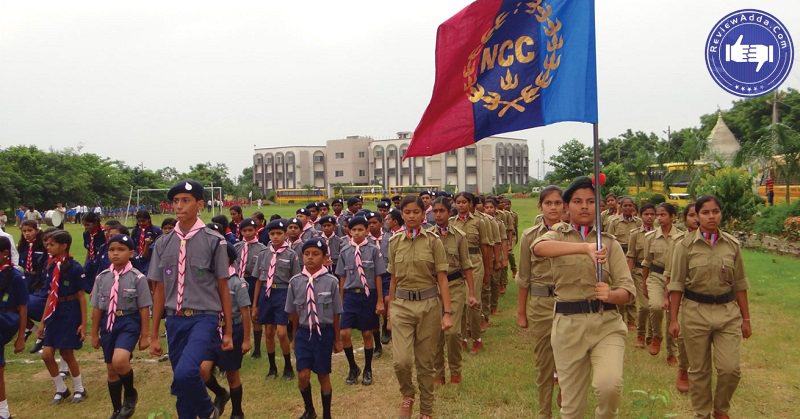Topic We Cover: NCC Vs Scouts and Guides Which One Most Important
1. NCC
- What is NCC?
- How to Join NCC
- Benefits of Joining NCC
2. SCOUT/ GUIDE
- What is Scouting?
- The Scout Method
NCC
NCC is a training program stands for National Cadet Corps. This program teaches students to follow a disciplined life. It is available and open to the students of schools and colleges. It’s a willing program and any student can accompany it. It’s a Tri-Services Organisation and engaged in grooming the youth in India to become patriotic citizens.

NCC training program offers several advantages to the trainees. After completing a minimum of 75% of NCC training, the students get a certificate from NCC according to their level. Students get help through these certificates in their career. There are several advantages of NCC certificates, but not abundant people know about them.
So, here in this article, we will make known you to the NCC and the benefits of NCC certificates.
What is NCC?
NCC is influential part of the Indian military cadet corps wing of the Indian armed forces stands for National Cadet Corps. The predominant purpose of the NCC is to offers training to the schools and colleges students. This is not mandatory training, students can opt for it as per their interest in it. Three years is the duration of this training program.
During training process of NCC, all the candidates get the fundamental and essential military training. This training session is organized to develop the concern of young students in all three Indian forces; the army, the navy and the air force. It is the platform offered by NCC to the students so that they could go through their abilities to join the Indian Defence Services. That’s why one of the advantages of the NCC certificate is that the candidate gets some relaxation during the selection of the army.
According to the National Cadet Corps’, the principal goal of NCC is to create a trained, organized, and motivated youth. With this ambition, National Cadet Corps not only creates extremely brave soldiers for the nation but it also evolves the leadership skills in the youth.
How to Join NCC
NCC is open for all Indian student either girl or boy. NCC is divided into two wings; The Junior wing and the senior wing. Below mentioned are the details which describe how to join the respective wings of NCC.
Junior Wing: To join the NCC Junior wing the minimum requirement of age is 13 years. The Junior wing training enrollment period is 2 years. The candidate requires contacting the headmaster or principle of his/her school to join NCC. If the candidate’s school has not having facility of NCC training then the student can approach to the nearest NCC Unit to contact Commanding Officer for further guidance.
Senior Wing: The required candidate’s age should be up to 26 years to join the senior wing. The enrollment period is 3 years for this training program. Students need to follow the similar process as mentioned above to join senior wing.
Benefits of Joining NCC
As we have already mentioned above that joining NCC grows interpersonal skills of the students. NCC training helps students who want to join Indian Arm Forces but it’s not the compulsion to the trainee to join any part of Indian Army after completion of the training. In the list of the benefits of NCC - self-discipline and problem-solving skills are also includes.
The leading advantages of NCC apart from personality developing skills, is the certificate you get after the completion of NCC training. After accomplishment of training and fulfilling other conditions like attendance etc, the candidate gets the certificate from the NCC. On the basis on the duration of the training program, three types of certificates offered by NCC. Here is the detail of the certificates given by NCC.
- ‘A’ Certificate
- ‘B’ Certificate
- ‘C’ Certificate
Here are the detailed benefits of NCC certificates.
‘A’ Certificate
If we are talking about the opportunity in government jobs then NCC ‘A’ certificate is not as useful as other NCC certificates. But the importance of NCC certificate is that it gives you a brief look of Indian army and it also brightens your chances to get the certificate ‘B’. Candidates who hold with NCC certificate ‘A’ get some advantages of marks in all the test of all the wings of Indian Army.
After spending 1-2 year duration of training in the junior wing the trainee will be eligible to get the ‘A’ certificate and must have attended one training camp.
‘B’ Certificate
‘B’ certificate can be achieved by candidates those are attending one training camp and spending 1-2 years duration in the junior wing. To get the ‘B’ certificate, a candidate must have scored 75% of attendance in NCC training in the senior wing.
The students who want to join Indian Army as ‘Jawan’ NCC certificate ‘B’ will be helpful for them. The important benefit of NCC certificate ‘B’ is that now you are able to enroll for the ‘C’ certificate of NCC which is very useful. After achieving ‘B’ certificate, NCC Trainees also get some extra marks as benefit in the dept. of telecommunication and few other public sectors.
‘C’ Certificate
Candidates who have got a ‘B’ certificate can only get the ‘C’ certificate. The deserving candidate must have attended minimum 75% of total training parade. Candidate must be in the 3rd year of training program and have attended min. two national pieces of training.
The ‘C’ certificate is the most essential and influential certificate of NCC training. The gains of NCC certificate ‘C’ always give an advantage to the candidate in the selection procedure of armed forces.
Let’s have a look at the advantages of NCC certificate ‘C’.
 Get Updated Review ( Voice Based Alumni Feeback)
Get Updated Review ( Voice Based Alumni Feeback)
-
 Check Review (Alumni Feedback) - Lovely Professional University - [LPU] – Click Here
Check Review (Alumni Feedback) - Lovely Professional University - [LPU] – Click Here -
 Check Review (Alumni Feedback) - Amity University – Click Here
Check Review (Alumni Feedback) - Amity University – Click Here -
 Check Review (Alumni Feedback) - University of Petroleum and Energy Studies [UPES] – Click Here
Check Review (Alumni Feedback) - University of Petroleum and Energy Studies [UPES] – Click Here -
 Check Review (Alumni Feedback) - SRM University, Sonepat – Click Here
Check Review (Alumni Feedback) - SRM University, Sonepat – Click Here -
 Check Review (Alumni Feedback) - Chitkara University – Click Here
Check Review (Alumni Feedback) - Chitkara University – Click Here
Indian Army
If we are talking about Indian Army then we must know that, the Indian Military Academy (IMA) has 32 vacancies reserved for the ‘C’ certified NCC candidates in every regular course. But to accompany IMA it’s a mandatory for all the candidates to be declared successful by the Services Selection Board.
The cadets with ‘C’ certificate are exempted from CDS examination organized by UPSC. But for this, in ‘C’ certificate the cadet must have ‘A’ or ‘B’ grade.
In paramilitary forces recruitment i.e. CISF, BSF, SSB, CRPF, etc., ‘C’ certification of NCC offers you 10–15 bonus points.
If a candidate having NCC ‘C’ certificates then your written exam will be waived off for the post of Soldier GD.
Indian Navy
In Indian Navy, the candidates with NCC ‘C’ certification get extra 6 marks for sailor’s job and extra 15 marks for Artificer Apprentices.
In Navy Up to 9 vacancies are reserved for NCC ‘C’ certified candidates. To get the recruitment done on these vacancies the candidate must have completed their B.Sc in physics or maths. B.E. candidates are also eligible for these vacancies. The candidate’s age group must be 19 to 24 years along with this they must passed by SSB exempted from CDS examination conducted by UPSC.
Indian Air Force
In Air Force, the advantage of 5 marks get by the candidate of NCC ‘C’ certified.
In course offered for Pilot have total 10% vacancies are reserved for NCC cadets.
Public Sector
Many organizations from the public sector give benefits to the cadets with ‘C’ certification like Pawan Hans Ltd, Indian Airlines, The National Small Industries Corp. Ltd. and many more.
Apart of this, there are many private sector companies those are consider the NCC certificates as an advantage. When you acknowledge in your resume about the NCC certified or achieved NCC ‘C’ certificate, it gives an idea to the selector about your personality. So we would advice the students should join NCC not only to join Indian Armed Forces but to be a disciplined person.
SCOUT/ GUIDE
“Now-a-days, a lot of youngsters are facing problems due to lack of self-confidence. Joining the movement of scout will develop a sense of self-confidence and braveness. He advised the students to study well, participate in extra-curricular activities, besides excelling in academics, and obey their parents.
Founder and Chairman of Patel Scout and Guide Groups, K. Kamalakannan, said that every student should join scouts and guides to become responsible citizens.
“It fosters personality development of the students and help them imbibe a sense of social responsibility. They become disciplined and courageous, and are in forefront during critical times,” he added.
He urged the students to do well in their studies, take care of their family, and be a part in scouts and guides activities.
What is Scouting?
Scouting is an enjoyment with a meaning, directed towards assisting boys and girls become happy, healthy, responsible citizens
In 2000, World Organization of the Scout Movement; adapted by Scouter Liam Morland.
Scouting is...
Education for Life
Scouting accompaniment the school and the family, contents needs not met by either. Scouting creates self-knowledge and the need to explore, to find, and to learn. Scouts find the world beyond the classroom, tapping the skills of others to get to know and to become well-rounded people.
Fun with a Purpose
Through special interests, Scouting accomplishes its purpose of helping young people develop physically, socially, intellectually, and spiritually. Scouting is all about enhancing confidence and self-esteem, learning important leadership skills and life skills, team building, outdoor adventure, education, and fun! Scouts acquire information about how to make good choices and to take accountability for their actions so that they are prepared for their adult life as independent persons.
A Worldwide Movement
In more than 216 countries and territories, there are Scout associations and branches. Scouting has never stopped burgeoning since its establishing in 1907. Today there are over 25 million Scouts. In more than 90 years since Scouting was founded, over 300 million people have been members. While Scouting is suitable to local needs and culture, its Principles, Purpose, and Method are globally same.
Open to All
Scouting is open to all without any differentiation of origin, class, race, or creed, provided that the person voluntarily conforms to Scouting's Principles.
A Code of Living
Scouting's standards explain a simple code of living to which all Scouts make a personal assurance through the Scout Promise and Law. Scouting helps Scouts to acquire information on how to carry out their assurance in everyday life. This approach to life has divided into three dimensions:
- A Spiritual Dimension — A commitment to explore the religious value of life beyond the material world.
- A Social Dimension — Engaging in the enhancement of society, and respecting the excellence of others and the uprightness of the natural world. Promoting local, national, and international peace, accepting, and cooperation.
- A Personal Dimension — Growing a sense of personal responsibility and exciting the longing for responsible self-expression.
The Scout Method
The Elements
By the use of the Scout Method, Scouting's purpose is accomplished, which is a system of liberal self-education through:
- A Promise and Law — Preparing a personal assurance.
- Learning by doing — Favourable circumstances for new experiences. Active participation with others.
- Membership of small groups — In lodges, sixes, or patrols to grow leadership, individual responsibility, and group skills.
- Progressive and stimulating programs — On the interests of young people Progressive activities has been based. Activities in association with nature, a rich knowledgeable environment where creativity, simplicity, and discovery come together to provide adventure and challenge.
The Elements at Work
Scouts, Cubs, and Beavers have weekly meetings and other events, such as weekend camps and fun days. Meetings are filled with skills, games, crafts, and other activities. With the help of parents and other volunteers, adult volunteer Scouters operate the program. With the assistance of an adult Adviser, Venturers and Rovers, take responsibility for planning and running their own activities.
An Opportunity for Adults
Scouting relies upon on its adult volunteer Scouters for its operation. Adults can get involved as working directly with the kids, section Scouters; as Group Committee members, organizing the Scout Group on a local level; or as council members, hold up team members, and trainers, working behind the scenes to support the section Scouters. It is a chance to help young people develop and become better people, and a way to enhance the understanding between generations. In their service, adult Scouters get valuable training and experience, adding to their personal development.
The Mission of Scouting
The Scouting mission is to provide the education of young people, through a value system based on the Scout Promise and Law, to assistance to build a excelling world where people are self-fulfilled as individuals and play a effective and helpful role in society.
This is achieved by
- including them throughout their influential years in a non-formal educational process;
- using a particular method that makes each individual the principal agent in his or her advancement as a supportive, self-reliant, responsible and committed person;
- helping them to set up a worthy system based upon social, spiritual, and personal principles as expressed in the Promise and Law.
- For knowledge on Scouting's Purpose, Definition, Principles, and Method, please see Fundamental Principles, published by the World Organization of the Scout Movement.





.jpg)
